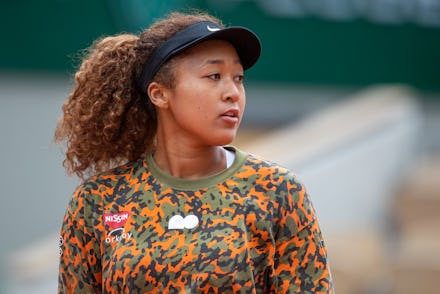Naomi Osaka skipping press at the French Open is a radical act of self-preservation

There’s something unnatural about the way athletes are expected to sit through press conferences as a part of their jobs. It’s an antiquated form of etiquette that we don’t seem to question. Obviously after a triumph the forced sit downs are more revelatory, and can make for entertaining or relatable moments with the athletes — but after a devastating loss, why does anyone think it’s their right to prod about how it happened? It’s a classic, “I don’t come to your job…” kind of moment. It’s also a very specific kind of press circus inherent to sports. Hollywood celebrities are certainly subjected to a litany of mentally harmful press, but no one is asking them why they didn’t win the Oscar.
This was underscored when Serena Williams left a press conference crying back in February after losing to Naomi Osaka in the semi-final of the Australian Open. Williams was made to sit afterwards and be asked the same riff on “Why did you lose?” and “Are you sad?” until it was too much. Infuriatingly, the press conference was just a small instance of the career-long racist and sexist abuses that the press and tennis overlords at large have thrown in Williams’ illustrious path, and forced her to fight against. The victor in said match came out this week though to take a stand against that very kind of invasive abuse. Naomi Osaka took to her socials to announce that she will not be doing press at the French Open.
In a notes app screenshot she explained, “I’ve often felt that people have no regard for athletes mental health and this rings very true when I see a press conference or partake in one...I’m just not going to subject myself to people that doubt me.” She goes on to explain that she doesn’t understand why people want to kick athletes when they’re down, and cheekily suggest that the massive fines she will incur for refusing to attend the mandatory conferences at the Open be donated to mental health charities.
It was a whole damn mood for her to stand up for herself and all athletes in such a powerful and direct way. It’s worth noting, then underlining, then highlighting — that women of color often do the heavy lifting of putting into perspective for society just how normalized abuse can be. Both Osaka and Williams have done that in tennis. The fact that it’s been their burden to stand against, though, is shameful. It’d be nice in the aftermath of Osaka’s pronouncement to see male tennis players back her up — but with the often rigid tennis establishment certainly ruffled by Osaka’s refusal to participate, only time will tell if any other player will want to join in on the row.
This isn’t the first time that both Williams and Osaka have been pulled into the same fight against the antiquated athletic establishment, and the adjacent members of the sports industry who feel they deserve unnecessary access to players. In 2018 when Williams lost to Osaka in the U.S. Open women’s final, attention was sharply drawn to the way the chair umpire Carlos Ramos treated Williams — citing three code violations that all seemed like things he would not have cited a man for. A horrifically racist cartoon by Mark Knight ran in Australia’s Harold Sun afterwards depicting Williams as an oversized, furious caricature stomping on her racket, while a blonde, thin opponent was told to “Just let her win,” by the umpire in the background. Not only was the depiction of Williams inexcusable and derogatory, the white washing of Osaka — who is Japanese-Haitian — only brings into sharper relief the way the tennis industry cannot handle two strong women of color being world champions.
Unlike with other types of celebrity, fanatical seems to be the only way to describe a lot of sports fandom. People live for matches, games and players. Money is bet. Dips are served. Tempers flare. We bring athletes into our homes like family. And while sports are a sort of universal salve of camaraderie, rivalry and distraction from everyday life — the idea that athletes owe us anything beyond their athleticism needs reconsidering. We’ll see if after Osaka’s refusal to participate if the etiquette of athletic press conferences becomes regulated to be more respectful. Osaka poignantly included in her Instagram post a slide of the infamous video of a reporter attempting to rattle and undermine the joyful confidence of a very young Serena Williams — a nod to one of her most worthy opponent’s pasts, and both of their futures.